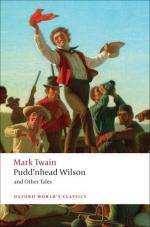‘I am the resurrection and the life—’
I turned away. I could not listen; I could not look. I did not know whither to go or what to do. Mechanically and without knowing it, I put my eye to that strange instrument, and there was Peking and the Czar’s procession! The next moment I was leaning out of the window, gasping, suffocating, trying to speak, but dumb from the very imminence of the necessity of speaking. The preacher could speak, but I, who had such need of words—’And may God have mercy upon your soul. Amen.’
The sheriff drew down the black cap, and laid his hand upon the lever. I got my voice.
’Stop, for God’s sake! The man is innocent. Come here and see Szczepanik face to face!’
Hardly three minutes later the governor had my place at the window, and was saying:
‘Strike off his bonds and set him free!’
Three minutes later all were in the parlour again. The reader will imagine the scene; I have no need to describe it. It was a sort of mad orgy of joy.
A messenger carried word to Szczepanik in the pavilion, and one could see the distressed amazement in his face as he listened to the tale. Then he came to his end of the line, and talked with Clayton and the governor and the others; and the wife poured out her gratitude upon him for saving her husband’s life, and in her deep thankfulness she kissed him at twelve thousand miles’ range.
The telelectroscopes of the world were put to service now, and for many hours the kinds and queens of many realms (with here and there a reporter) talked with Szczepanik, and praised him; and the few scientific societies which had not already made him an honorary member conferred that grace upon him.
How had he come to disappear from among us? It was easily explained. He had not grown used to being a world-famous person, and had been forced to break away from the lionising that was robbing him of all privacy and repose. So he grew a beard, put on coloured glasses, disguised himself a little in other ways, then took a fictitious name, and went off to wander about the earth in peace.
Such is the tale of the drama which began with an inconsequential quarrel in Vienna in the spring of 1898, and came near ending as a tragedy in the spring of 1904.
II
Correspondence of the ‘London Times’
Chicago, April 5, 1904
To-day, by a clipper of the Electric Line, and the latter’s Electric Railway connections, arrived an envelope from Vienna, for Captain Clayton, containing an English farthing. The receiver of it was a good deal moved. He called up Vienna, and stood face to face with Mr. K., and said:
’I do not need to say anything: you can see it all in my face. My wife has the farthing. Do not be afraid—she will not throw it away.’




